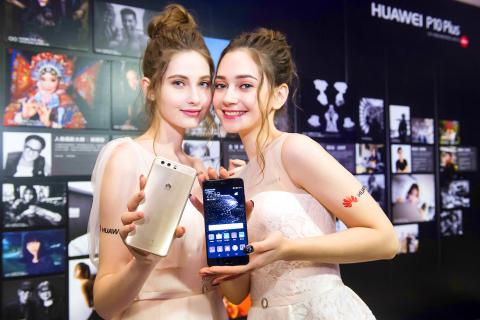Huawei Technologies Co (華為) yesterday launched its latest flagship smartphone P10 Plus in Taiwan.
“Instead of introducing both P10 and P10 Plus, we decided to focus our resources on the larger-sized P10 Plus only,” Huawei devices business department general manger in Taiwan Gary Tsao (曹紋察) told reporters at the launch event in Taipei.
The strategy was decided upon because sales of the 5.5-inch P9 Plus, the previous generation of the P series, contributed to 70 percent of Huawei’s total smartphone shipments in Taiwan last year, suggesting a strong market response to bigger-display smartphones.

Photo: CNA / Huawei Technologies Co
The P10 Plus features a front and back camera lens co-engineered with Leica. It will be available from Saturday and costs NT$23,900.
Huawei, which entered the Taiwan market in 2014, holds a 0.9 percent market share in terms of smartphone shipments, Tsao said, citing GfK data.
South Korea’s Samsung Electronics Co is the largest smartphone vendor in Taiwan with a 24.6 percent share of the market in February, followed by Apple Inc with 18.7 percent and Asustek Computer Inc (華碩) with 14.1 percent, local retail channels’ data showed.
Huawei aims to double its market share to 2 percent by April next year by spending more on marketing, Tsao said.
The company also plans to launch the lower-priced Y series, which costs less than NT$10,000, in June, and the higher-priced Mate series in the second half of this year to expand its presence in various price segments, he said.

TAKING STOCK: A Taiwanese cookware firm in Vietnam urged customers to assess inventory or place orders early so shipments can reach the US while tariffs are paused Taiwanese businesses in Vietnam are exploring alternatives after the White House imposed a 46 percent import duty on Vietnamese goods, following US President Donald Trump’s announcement of “reciprocal” tariffs on the US’ trading partners. Lo Shih-liang (羅世良), chairman of Brico Industry Co (裕茂工業), a Taiwanese company that manufactures cast iron cookware and stove components in Vietnam, said that more than 40 percent of his business was tied to the US market, describing the constant US policy shifts as an emotional roller coaster. “I work during the day and stay up all night watching the news. I’ve been following US news until 3am

Six years ago, LVMH’s billionaire CEO Bernard Arnault and US President Donald Trump cut the blue ribbon on a factory in rural Texas that would make designer handbags for Louis Vuitton, one of the world’s best-known luxury brands. However, since the high-profile opening, the factory has faced a host of problems limiting production, 11 former Louis Vuitton employees said. The site has consistently ranked among the worst-performing for Louis Vuitton globally, “significantly” underperforming other facilities, said three former Louis Vuitton workers and a senior industry source, who cited internal rankings shared with staff. The plant’s problems — which have not

TARIFF CONCERNS: The chipmaker cited global uncertainty from US tariffs and a weakening economic outlook, but said its Singapore expansion remains on track Vanguard International Semiconductor Corp (世界先進), a foundry service provider specializing in producing power management and display driver chips, yesterday withdrew its full-year revenue projection of moderate growth for this year, as escalating US tariff tensions raised uncertainty and concern about a potential economic recession. The Hsinchu-based chipmaker in February said revenues this year would grow mildly from last year based on improving supply chain inventory levels and market demand. At the time, it also anticipated gradual quarter revenue growth. However, the US’ sweeping tariff policy has upended the industry’s supply chains and weakened economic prospects for the world economy, it said. “Now

COLLABORATION: Given Taiwan’s key position in global supply chains, the US firm is discussing strategies with local partners and clients to deal with global uncertainties Advanced Micro Devices Inc (AMD) yesterday said it is meeting with local ecosystem partners, including Taiwan Semiconductor Manufacturing Co (TSMC, 台積電), to discuss strategies, including long-term manufacturing, to navigate uncertainties such as US tariffs, as Taiwan occupies an important position in global supply chains. AMD chief executive officer Lisa Su (蘇姿丰) told reporters that Taiwan is an important part of the chip designer’s ecosystem and she is discussing with partners and customers in Taiwan to forge strong collaborations on different areas during this critical period. AMD has just become the first artificial-intelligence (AI) server chip customer of TSMC to utilize its advanced